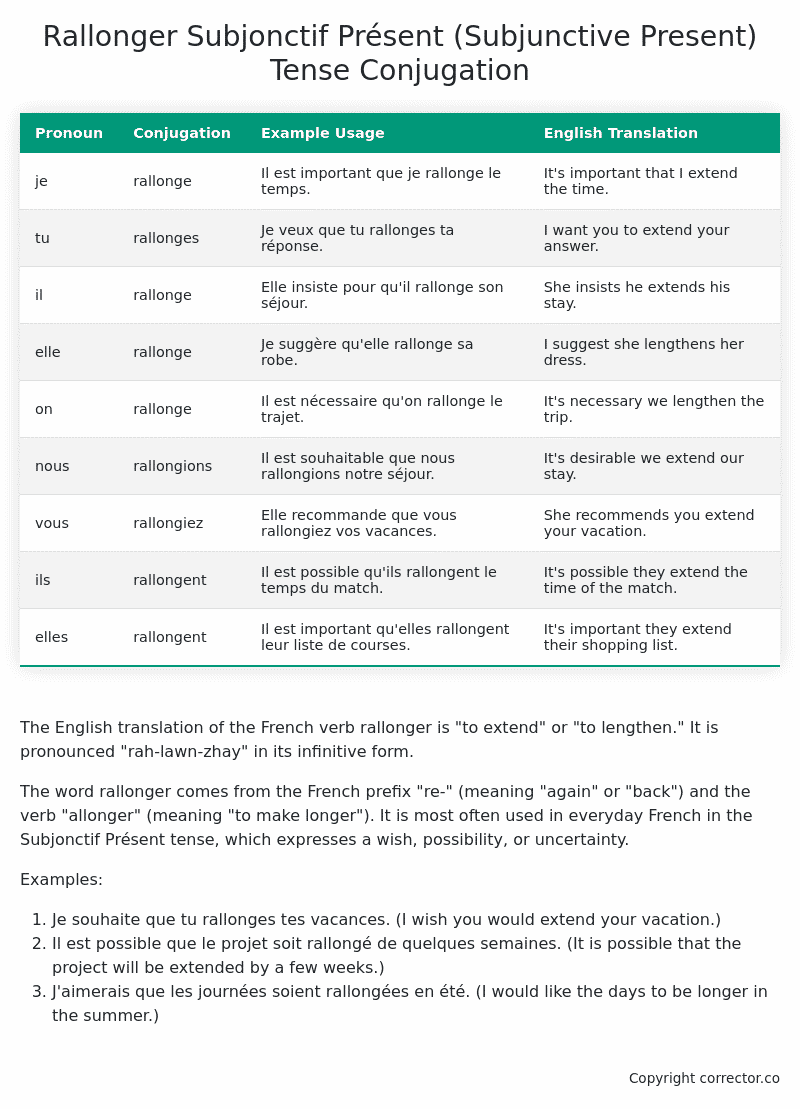Subjonctif Présent (Subjunctive Present) Tense Conjugation of the French Verb rallonger
Introduction to the verb rallonger
The English translation of the French verb rallonger is “to extend” or “to lengthen.” It is pronounced “rah-lawn-zhay” in its infinitive form.
The word rallonger comes from the French prefix “re-” (meaning “again” or “back”) and the verb “allonger” (meaning “to make longer”). It is most often used in everyday French in the Subjonctif Présent tense, which expresses a wish, possibility, or uncertainty.
Examples:
- Je souhaite que tu rallonges tes vacances. (I wish you would extend your vacation.)
- Il est possible que le projet soit rallongé de quelques semaines. (It is possible that the project will be extended by a few weeks.)
- J’aimerais que les journées soient rallongées en été. (I would like the days to be longer in the summer.)
Table of the Subjonctif Présent (Subjunctive Present) Tense Conjugation of rallonger
| Pronoun | Conjugation | Example Usage | English Translation |
|---|---|---|---|
| je | rallonge | Il est important que je rallonge le temps. | It’s important that I extend the time. |
| tu | rallonges | Je veux que tu rallonges ta réponse. | I want you to extend your answer. |
| il | rallonge | Elle insiste pour qu’il rallonge son séjour. | She insists he extends his stay. |
| elle | rallonge | Je suggère qu’elle rallonge sa robe. | I suggest she lengthens her dress. |
| on | rallonge | Il est nécessaire qu’on rallonge le trajet. | It’s necessary we lengthen the trip. |
| nous | rallongions | Il est souhaitable que nous rallongions notre séjour. | It’s desirable we extend our stay. |
| vous | rallongiez | Elle recommande que vous rallongiez vos vacances. | She recommends you extend your vacation. |
| ils | rallongent | Il est possible qu’ils rallongent le temps du match. | It’s possible they extend the time of the match. |
| elles | rallongent | Il est important qu’elles rallongent leur liste de courses. | It’s important they extend their shopping list. |
Other Conjugations for Rallonger.
Le Present (Present Tense) Conjugation of the French Verb rallonger
Imparfait (Imperfect) Tense Conjugation of the French Verb rallonger
Passé Simple (Simple Past) Tense Conjugation of the French Verb rallonger
Passé Composé (Present Perfect) Tense Conjugation of the French Verb rallonger
Futur Simple (Simple Future) Tense Conjugation of the French Verb rallonger
Futur Proche (Near Future) Tense Conjugation of the French Verb rallonger
Plus-que-parfait (Pluperfect) Tense Conjugation of the French Verb rallonger
Passé Antérieur (Past Anterior) Tense Conjugation of the French Verb rallonger
Futur Antérieur (Future Anterior) Tense Conjugation of the French Verb rallonger
Subjonctif Présent (Subjunctive Present) Tense Conjugation of the French Verb rallonger (this article)
Subjonctif Passé (Subjunctive Past) Tense Conjugation of the French Verb rallonger
Subjonctif Imparfait (Subjunctive Imperfect) Tense Conjugation of the French Verb rallonger
Subjonctif Plus-que-parfait (Subjunctive Pluperfect) Tense Conjugation of the French Verb rallonger
Conditionnel Présent (Conditional Present) Tense Conjugation of the French Verb rallonger
Conditionnel Passé (Conditional Past) Tense Conjugation of the French Verb rallonger
L’impératif Présent (Imperative Present) Tense Conjugation of the French Verb rallonger
L’infinitif Présent (Infinitive Present) Tense Conjugation of the French Verb rallonger
Struggling with French verbs or the language in general? Why not use our free French Grammar Checker – no registration required!
Get a FREE Download Study Sheet of this Conjugation 🔥
Simply right click the image below, click “save image” and get your free reference for the rallonger Subjonctif Présent tense conjugation!

Rallonger – About the French Subjonctif Présent (Subjunctive Present) Tense
Formation of the Subjonctif Présent
Common Everyday Usage Patterns
Interactions with Other Tenses
Summary
I hope you enjoyed this article on the verb rallonger. Still in a learning mood? Check out another TOTALLY random French verb conjugation!


